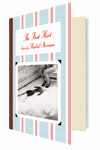
In the middle of her startling debut collection, The First Hurt, Rachel Sherman takes us back to summer camp: “Bunk K is made of logs and screens and is filled with eleven-year-old girls. These girls still wake up easily and early; they do not wear deodorant yet.” I too was a preteen camper; I made a bunk my home on Lake Cobbosseecontee, Maine, and it was good to be back. As Sherman knows, things get trickier once a girl starts to sweat.
There are lots of secretions in The First Hurt: clogged pores, open sores, rashes. There are kids with greasy hair and broken bones and grown-ups who keep picking at things that should be left alone. This is the ugly and wonderful landscape of adolescence, as described by girls in its throes or by adults watching them closely.
As in A. M. Homes’s The Safety of Objects, the angst here is set in well-groomed places—developments, summer houses, manicured streets. Sherman’s suburbia is pleasingly vivid and off-kilter; the familiar details (mauve bedroom carpets, moms who bleach their mustaches) are juxtaposed with Things We Don’t Care to Speak Of. In “Two Stories; Single Family; Scenic View,” a young couple discovers that their neighbors’ house is a mirror reflection of their own, and that something is terribly wrong with their newborn twins. Unhappiness is transferred neatly here: the husband stares at the curvy teen next door (aptly nicknamed McBooty), and the wife stares at him staring. (No one looks carefully at the children.) This is a place of matching backyard swimming pools and of people trying hard to displace their grief.
Sherman’s straightforward prose provides a contrast to her characters’ unsettling behavior. In the title story, she summarizes a bizarre love triangle in one spare and unpretentious paragraph:
Ham has an anorexic girlfriend named Gretchen who already graduated and is waiting for him to finish his senior year. Gretchen wants to go with him where he goes so she can dirty his new college sink with her water throw-up. She fills the empty space beside him in his Jeep and I imagine her pushing her bony hips up to meet his whenever they are alone.
And yet the way people collide in Sherman’s world is oddly witty. There’s relief in seeing flaws distributed so evenhandedly. We see a pervy pen pal who calls himself “The Reaper” (in letters to a high school student), a Danish au pair who can’t hack her job, a child who sleepwalks and names her Barbies after Greek gods, a teacher who nonchalantly seduces her students. There’s a bowlegged man and a crazed butcher too, for good measure.
Despite such dysfunction, Sherman continues to emphasize the unblemished phase. In the summer camp story, “Keeping Time,” she describes a simple game I wish my counselor had played with us: 1. Place all girls cross-legged in a circle. 2. Drop a handful of M&Ms in the palm of each. 3. Ask the Undeodorized to answer two simple questions: What do you love? (Answer and eat a red one.) What do you hate? (Answer and eat a green.)
Her girls will pick at themselves later on, but here they’re still willing to talk about the things that matter most. Sherman aptly gives us both extremes. (Step 4: Repeat until all candy is gone.)
—Lara Tupper





